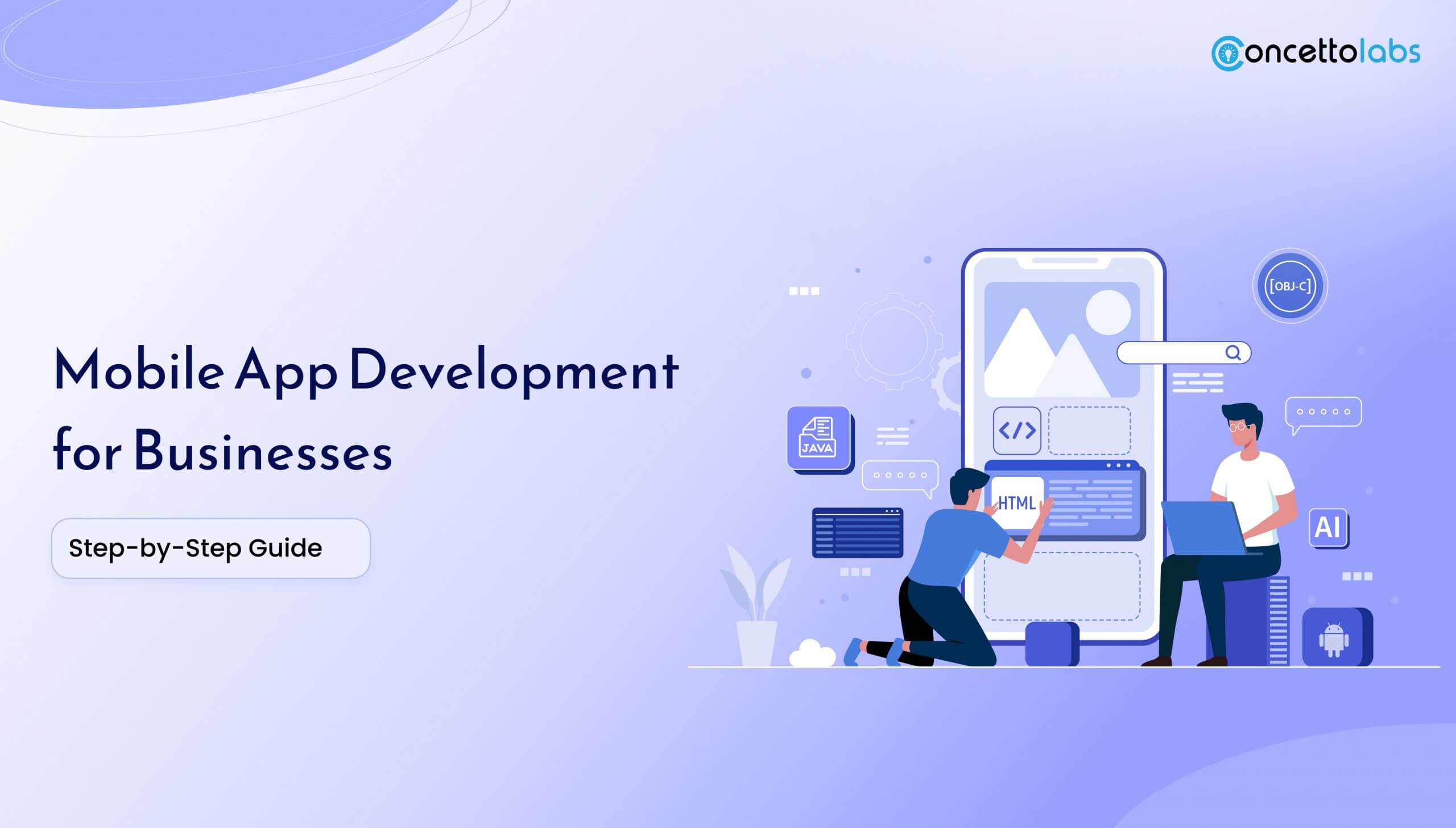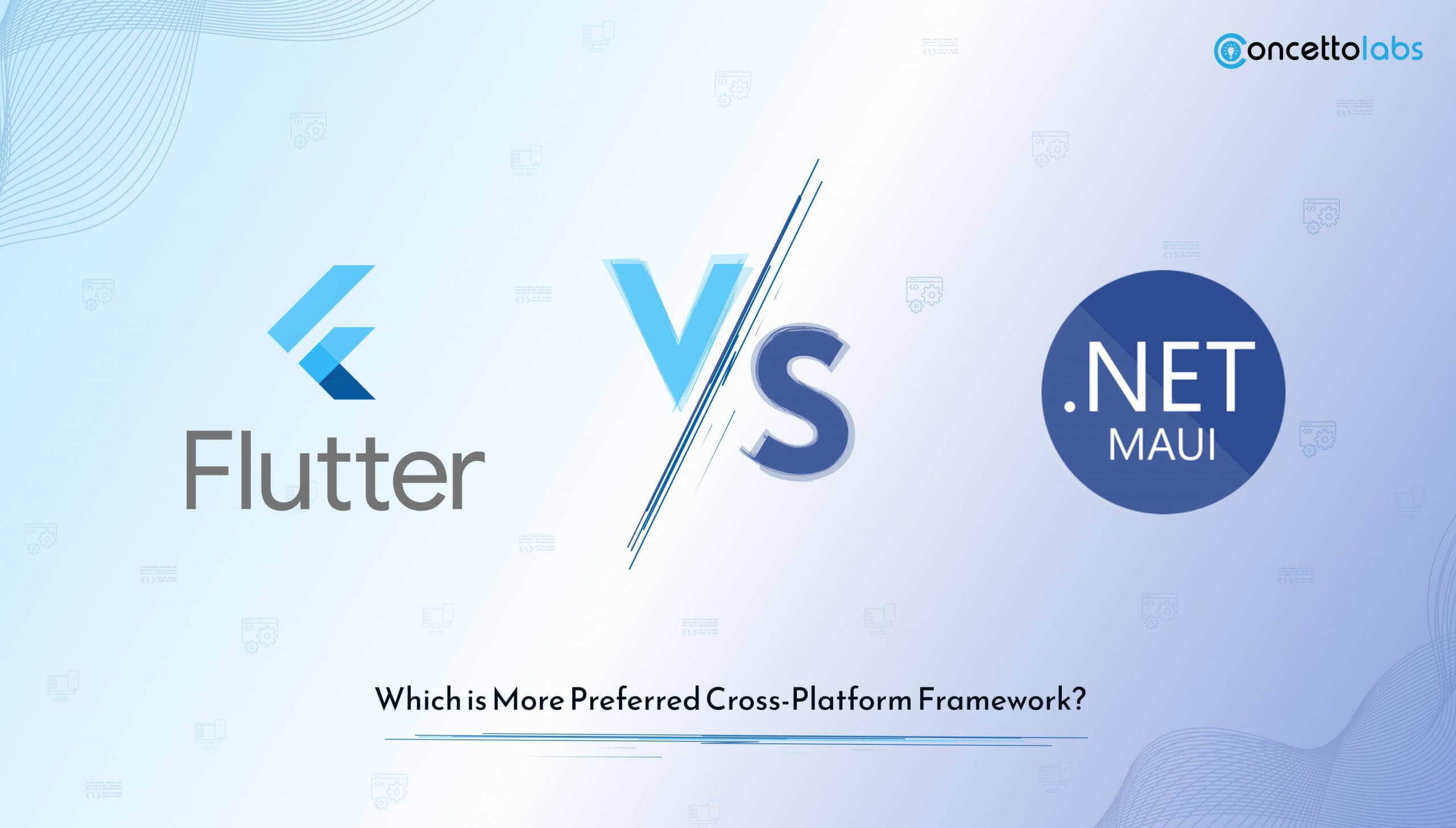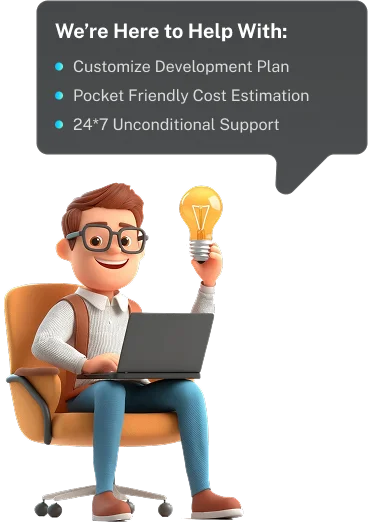
Are you in a fix on which cross-platform technology is the best for your mobile application development needs? The long battle between the two leading cross-platform frameworks- Kotlin VS Flutter, never ends.
The question is, which programming language best suits your needs? Concetto labs, the leading custom software, and app development company, is here to help you with this blog.
The blog discusses the top features, pros, and cons of Kotlin and flutter technologies. Further, it highlights the popularity, market share, performance, and other app development factors to make your decision easier.
Many businesses choose to go for cross-platform app development these days. It is a great way to reach more audiences on a budget. Though choosing the right development technology is essential.
Why cross-platform development gained traction? It is owed to the fact that Android and iOS together make up 99% of the mobile OS market. So, why not tap into both markets together? This encouraged more firms to find better app development options. And it led to the battle of two top cross-platform technologies in 2022-” Kotlin Vs Flutter”.
Earlier, the debate on the best cross-platform technology was between React Native VS Flutter. But with the advent of Kotlin, which is fully interoperable with Java, the contenders for the debate changed.

Now the new battle between Flutter Vs Kotlin is getting more aggressive. More companies are wondering what to choose. But, before we go head to head on Kotlin Vs. Flutter, Let’s understand what they are.
What is Kotlin?

Kotlin is a powerful development language designed by JetBrains. One of the reasons for the popularity of Kotlin is that Android has rendered complete support to Kotlin.
What is Kotlin Multiplatform?
Kotlin Multiplatform is a cross-platform extension of the language. It thrives on shared code. The open-source programming language is supported by JVM or Java Virtual Machine for development.
The code-sharing expertise of Kotlin extends to Android, iOS, Windows, Linux, and Mac. It can reduce development efforts with reusable codes.
Kotlin works as a multiplatform in an SDK that allows reusing business logic by building iOS, Android, and Desktop applications. It even helps in backend development in Java frameworks like Spring.
What are the features of the Kotlin language?

Kotlin is highly popular among developers for Android development. But, why do they prefer Kotlin for Android? What are the benefits of using Kotlin over Java? Have a look at the features and the benefits Kotlin offers to get the answer.
1. Java Interoperability
One of the major and best features of Kotlin is its interoperability with JAVA. Kotlin uses Java libraries and tools and offers backward compatibility for Java versions 6 and 7.
Many Java developers are thus attracted to learning Kotlin as they can switch the programming language. They can compile one Android project in both Java and Kotlin. Thus, they can save tons of effort and valuable time.
-
- Lazy loading feature
The feature reduces the Android startup time and shows content faster. It helps developers load the essential resources into the main memory to show the content faster.
For example, if you have a shopping app, Kotlin will show the products for users to browse quickly and keep the payment API lazy-loaded.
2. Data Classes in Kotlin
Android developers can write an equivalent of the Java boilerplate codes using fewer codes and simple language. They no longer need to skip that boilerplate code. Thus, it is an important feature for developers.
3. Reduces runtime crashes
This is the most sophisticated feature of Kotlin, making it simple to spot the NullPointerException as your Android app development project is being compiled. It assures that every variable operates as a non-null value and lowers the frequency of runtime crashes.
Additionally, adding a question mark to the end of the variable type will lessen crashes if you choose to keep a null value. On this basis, runtime crashes can be readily decreased.
4. Low Cost
Another major reason for the popularity of Kotlin is that it costs nearly nothing. The language is open source, and thus entrepreneurs can save costs on licenses. Furthermore, the language is quick and easy to learn.
5. Clean and Compact Syntax
Kotlin offers much cleaner code than Java. Developers can develop applications with fewer codes. Thus, fewer chances of errors and bugs. Further, if the code is less, it is easy to maintain and modify.
Get Complete guide on Kotlin vs Flutter Platform Technology
Click HereWhy Should You Prefer Kotlin Over Java?
Java
Java is portable, and developers can execute Java code on any computer that supports Java Virtual Machine (JVM). The language checks errors at compile time and supports multithreading. Further, the features like encryption-based authentication and a virus- and tamper-proof system make it secure to use on any platform.
Kotlin
Kotlin codes are 20% shorter than Java; thus, maintaining the code quality is more efficient. Kotlin is fully interoperable with Java, allowing developers to execute the codes of Java in Kotlin and vice versa.
Further, Kotlin allows programmers to add new functionality to applications or components without changing the main code.
Java VS Kotlin: Quick Comparision

What are the benefits of Kotlin?
- Maximizes Productivity
- Interoperable With Java
- Easy to Maintain
- Less Buggy
- Easy to Learn
- More Reliable
Cons of Kotlin
- Lack of Kotlin Experts
- Slow in Compilation
- Limited Documentation
Want to create something similar?
Get estimation for your requirements for free as well as kick start your project within Screen 24 hours.
Contact UsWhen to use Kotlin?
Kotlin is a cross-platform programming language that relies on the Java class library. The scope of Kotlin is unlimited. For example, Pinterest has moved from Java to Kotlin, providing users with a better interface.
- Add Features to an existing app: When you want to add extra features to an existing app instead of revamping the entire architecture, Kotlin is a perfect choice.
- Inbuilt Debugging: Kotlin can search for bugs automatically and prevent them from returning. It is safer than Java and resolves crashes instantly.
- Simple Syntax for Sophisticated codes: It’s easy to write and deploy codes in Kotlin. They are used in apps that require heavy coding and are simple to maintain.
Popular Mobile Apps developed Using Kotlin.

- Netflix
- Tinder
- Trello
What is Flutter?

Powered by Dart, Flutter is a powerful programming language that creates native-like mobile applications using a single codebase. The developers can build applications for iOS and Android using the same code in Flutter. Programmers can also use Flutter to build applications for macOS.
Dart- the programming language of Flutter enables programmers to create applications that are highly responsive and perform better.
Features of Flutter

1. Dart benefit
Flutter has the added benefit of having Dart as its official programming language. The combination of Dart and Flutter helps programmers create fully functional applications using fewer codes. Further, it allows quick installation of applications in less than 30 minutes.
2. Open-Source
Flutter and Dart are both open-source. Thus, programmers get free access to the original code and all the documentation. Further, Flutter’s documentation is user-friendly, so developers can easily navigate to find the answers to all their questions.
3. Hot Reload
The hot reload feature allows developers to edit the code and see the changes in real-time. They can easily see the new changes made in the backend on the frontend immediately, without the need to reload the app repeatedly. Thus, they can save a lot of time and make changes conveniently.
4. Native-feel
Flutter offers a native-like fee for the applications and offers faster performance. Since Flutter allows developers to create applications into the machine code, it offers quicker performance. Machine code reduces the chances of bugs in apps, thus improving speed and efficiency.
Pros of Flutter
- Quick code writing
- Single code for multiple platforms
- Faster application development
- Consistent UI
- Good for MVPs
- Fully customizable
- Faster Rendering
Cons of Flutter
- Large App sizes
- New Language
- Frequent Changes
- Lack of standard guidelines
When to use Flutter?
So, what is Flutter used for, and when you should choose Flutter for your cross-platform development needs?
- To build Applications with A Complex User Interface.
Flutter offers complete control over each pixel of the screen. Thus, Flutter applications look the same on every device. Thus, developers can create complex user interfaces without affecting the performance of the applications.
- To Build Applications With Excellent Performance
Writing codes in Flutter is swift. In addition, Flutter offers a pool of widgets that make coding development easier. Further, the hot reload feature allows programmers to see changes in real-time so they can quickly fix bugs.
- For Simple Set-up: Flutter has a bright future for the developer.
- For Building Minimum Viable Product: Develop a conceivable app and give more apparent item thought.
Popular Apps Developed Using Flutter

- Google Ads
- PostMuse
- KlasterMe
- SpaceXGo!
Kotlin Vs Flutter Comparison- Various Parameters
1. Kotlin VS Flutter: Learning Curve
Regarding a new language, developers first look at the learning curve. Is the language easier to learn or not? Google offers many courses for developers to make Kotlin easier to learn. Further, many Java developers want to learn Kotlin as it is interoperable with Java.
However, developers have limited resources to learn Kotlin multiplatform extension of Kotlin. On the other hand, Flutter has extensive documentation compared to Kotlin.
2. Kotlin VS Flutter: Popularity
Both technologies enjoy great popularity among developers for developing mobile applications.
- Stackoverflow Popularity
According to a Stack Overflow survey, Kotlin ranks second in the most loved programming languages list. Nearly 9.16% of developers use Kotlin, while 12.64% of programmers use Flutter. The median yearly salary of a Kotlin developer has increased to $69 318 in 2022 from $55,071 in 2021.
- GitHub Popularity
Based on GitHub’s popularity, Flutter enjoys 144K stars and 23.1K forks, while Kotlin has 42.5K stars and 5.2 forks.
- Google Trends Popularity
The Google trends graph below shows the data for the past 12 months (Oct 2021- Aug 2022). There is a constant rise in the popularity of both technologies. The average queries asked about Kotlin from Sep 25, 2022, to Oct 1, 2022, are 49, whereas, for Flutter, they are 91.
3. Flutter VS Kotlin: Performance
We often hear about cross-platform apps being low on performance. One of the biggest challenges in cross-platform development is native access. Companies develop apps that work across platforms. But, that cannot access native features.
Developers use Kotlin, particularly for developing Android applications, which offers excellent performance. It enables developers to write codes in platform-specific formats. So, access to the platform-related elements is not difficult.
On the other hand, Flutter offers Hot Reload and Hot Restart features that allow developers to see the changes in the applications in real-time. Thus, the application development process speeds up positively. Further, developers can compile codes directly to machine codes leading to the development of staggering fast applications.
Flutter has more outstanding prowess in performance. It enables developers to mitigate platform restrictions and provides excellent native access through Dart.
4. Kotlin Vs Flutter: The UX
The most vital part of any business is consumer satisfaction. Consumer satisfaction depends on the User Experience or UX of an app. A User Interface or UI creates better UX for companies. Here, both cross-platform development platforms have different ways to create UIs.
Flutter offers a widget-based UI creation and offers numerous customization features. Designers and developers can create unique and scalable applications easily. Developers can leverage widget trees to develop excellent UI components. It is not a standard UI design method. But, it is still an effective one for the developers.
While Kotlin offers pure UI design prowess, it allows developers to create UI like any native app development platform. It does not need any extensive method like a widget for UI creation.
5. Kotlin Vs Flutter: The Langauge
When it comes to programming languages, it is more like JavaScript vs Java. Flutter is a framework built on Dart programming language. Dart is a very easy-to-understand language and has a syntax based on JavaScript. A firm can hire Flutter developers from India, the US, or anywhere else with JavaScript skills.
Kotlin is a Java-based platform. Kotlin is interoperable with the Java language. So, any developer well-versed in Java can learn Kotlin.
6. Third-party Libraries & Integrations
Kotlin works in the native environment for developing android applications. Developers can thus use tools and libraries similar to native app development, like Jetpack Compose and SwiftUI. Thus, programmers need not look for third-party libraries and tools and can save time.
On the other hand, Flutter requires programmers to look for third-party libraries and tools for designing and developing apps.
7. Kotlin Vs Flutter: The Backend
A backend service is essential to any mobile application. All the interactions between users and systems need good backend support. Without it, the system’s low efficiency in handling several user requests.
Flutter does an excellent job for the backend. It uses Firebase for effective BaaS(Backend as a Service) that offers an excellent backend for real-time data requests. Most backend technologies use HTTP calls for data requests by the user. But, with Flutter, you get Firebase that leverages web sockets for data requests.
Kotlin does not use any such BaaS. It allows the developers to write their backend code. So, Kotlin enables better customizations for the backend.
8. Kotlin Vs Flutter: Device Support
While both are cross-platform frameworks, Kotlin Vs. Flutter differs in support of Android devices. Flutter renders support to mobile, web, and desktop applications. It lacks support for devices like tvOS, watchOS, carOS, and others.
While Kotlin has no such restrictions, it can help you develop applications for different devices beyond mobile or web.
9. Flutter VS Kotlin: Documentation
Flutter is open-source and offers extensive documentation for users. Along with that, users can also use a rich arrangement of testing capacities and widget testing features. Thus, it enables developers to perform unit testing at a greater speed. On the other hand, Kotlin is still new and, thus, fails to offer extensive documentation.
Which Platform is Better for Developing an application?
Get complete guide on Cross-Platform Technology
Contact Us
Quick Comparison Between Flutter VS Kotlin

Final Verdict
So, who is the winner? Well, we explored different aspects of both frameworks. And we concluded that Flutter remains a clear winner as of now. Flutter is easy to understand, has higher performance, and has a great UI framework.
Kotlin is new to the domain and has much to improve. But, there is no denying the fact that Kotlin has the potential to fight it through.
So, if you want to scale your business higher, choose the best Flutter mobile app development services for your cross-platform app. Further, business owners can hire Android Developers or hire Flutter App developers to grow their business globally.
Both Flutter and Kotlin for Android have exciting ways of building cross-stage and local applications. It relies on a particular task and its necessities so that you can pick anyone. Additionally, Flutter adds more flavor and trending choices for Android Application Development Company.
Frequently Asked Questions
Here are some frequently asked questions about employing our developers that may help you.
- Easier Implementation
- Quicker development time
- Control cost
- Reusable Codes
- Sameness and Uniformity









 Indonesia
Indonesia
 Botswana
Botswana
 USA
USA
 Italy
Italy
 Panama
Panama





 USA
USA UK
UK Saudi Arabia
Saudi Arabia Norway
Norway India
India Australia
Australia